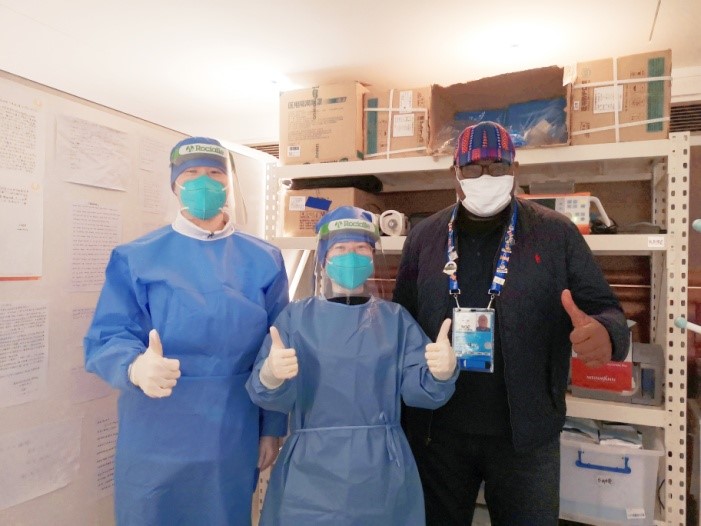Mr. M, an international expert with a 13-year history of hypertension, came to Beijing for the Winter Olympics. Due to work fatigue and climate reasons, his blood pressure soared to 190/110mmHg, but his serum potassium was only 2.7mmol/L. PUMCH not only helped him successfully deal with his chronic illness, but also found the most probable cause of the resistant hypertension lasting 13 years. Mr. M left when the snow was just beginning to melt, and he thanked the medical staff repeatedly: “It’s really cold, but your care makes me feel warm!”
At 21:58 on the evening of February 6, 2022, the medical service station received a 57-year-old Mr. M. His blood pressure was as high as 190/110 mmHg, which drew the attention of medical staff. After inquiring about his medical history in detail, the doctor found out that Mr. M had a history of high blood pressure for 13 years. He was currently taking 4 antihypertensive drugs, but his blood pressure was still “resistant” to the drug effect. Previously his systolic blood pressure had been 140-160 mmHg, and diastolic blood pressure about 100 mmHg, with the cause of hypertension never screened. The patient arrived in Beijing 3 days ago and was too busy working to remember to take antihypertensive drugs, which further increased his blood pressure.
The medical service station immediately contacted the PUMCH Winter Olympic Ward for transfer. At 22:30, the medical service station contacted an ambulance for Mr. M. At 22:50, he arrived at the Winter Olympic Ward and immediately received blood pressure monitoring, ECG, blood biochemistry and other assessments. A cardiologist came for consultation and adjusted the antihypertensive treatment plan for him. After a while, the test results came out and showed that his serum potassium was only 2.7 mmol/L (the normal range is 3.5-5.5 mmol/L), accompanied by suspected metabolic alkalosis, and a carbon dioxide combining power that reached 35 mmol/L.
The abnormal results sounded the alarm to doctors. While quickly giving the patient potassium supplementation and antihypertensive treatment, the Winter Olympic Ward invited cardiology and endocrinology specialists for a consultation. Deep into the night, the specialists carefully reviewed all of Mr. M’s lab results and analyzed them meticulously to find the cause. Although the patient’s previous antihypertensive medication contained a diuretic, the dosage he took usually would not cause such severe hypokalemia. Therefore, the doctors made a preliminary judgment that endocrine-related hypertensive disorders were the most likely “suspect”. The consulting physicians recommended that Mr. M. undergo further testing of adrenal glands and related endocrine hormone levels.
However, Mr. M had a lot of work to do, and he chose to return to his place of residence and visit the medical service station for follow-up observation. Given the freezing cold and the snow, as well as work fatigue, which was the trigger of his conditions, the doctors were all worried about his fluctuating blood pressure. In light of this, the Winter Olympic Ward developed a targeted plan for him and asked the medical staff at the medical service station to strictly monitor his morning and evening blood pressure and weight every day, and give targeted treatment and health education to the patient.
Three days later, Mr. M came back to PUMCH for a follow-up examination. His blood pressure was still high, hypokalemia persisted, and the 24-hour urinary potassium was significantly elevated, and the CT report showed bilateral adrenal hyperplasia and nodules. The Department of Medical Affairs again organized a multidisciplinary consultation with specialists from the Department of Endocrinology, Urology, Radiology, Cardiology and Anesthesiology, etc.
Based on a thorough and painstaking analysis of his medical history, vital signs, past history and medications, the doctors finally came to the conclusion that primary hyperaldosteronism was the most likely cause of Mr. M’s conditions. After thorough consideration and detailed discussions, the doctors made a major adjustment to the treatment plan of Mr. M, carefully examined the changes in blood pressure and serum potassium, and informed him of the test results by email, suggesting that he receive treatment as soon as possible. Before Mr. M left Beijing, the doctors in the Winter Olympic Ward and the medical service station reviewed his blood pressure and serum potassium again, and told him to receive more thorough examinations after returning to his home country, take the drugs on time and monitor his blood pressure daily.
On the day that Mr. M left Beijing, he profusely expressed gratitude to the medical staff. He said that he had had hypertension for 13 years and was never able to keep it under control, but PUMCH helped him find the most probable cause during his merely 10-day stay in Beijing. He was truly impressed by PUMCH staff’s professionalism and utter dedication, and deeply touched by the follow-up, care and detailed medication instructions by doctors at the medical service station and the PUMCH Winter Olympic Ward. He wrote a letter of thanks in English, expressing his most sincere gratitude to the medical team.
Most of the patients that the PUMCH Winter Olympic Ward receives are elderly, have acute onset, and are in critical condition, with incomplete medical history information, which all add to the difficulty of diagnosis and treatment. The Winter Olympic Ward, with members that are all top performers selected from various departments and the multi-disciplinary strength of PUMCH to tap into, does not miss any clues and brings top specialists together for consultations around the clock to effectively tackle complex and difficult diseases. International patients and domestic patients from all over the country can all rest assured that they are in safe hands in PUMCH.

Mr. M happily pinned the PUMCH badge
Written by the Winter Olympic Ward and medical service station at the venues
Picture courtesy of the Winter Olympic Ward
Translator: Liu Haiyan
Editor: Wang Yao
